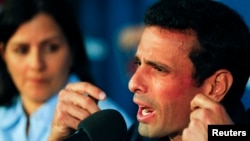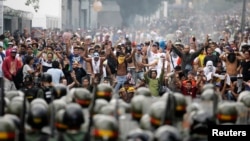CARACAS —
Venezuela's government-controlled parliament on Wednesday set up an inquiry into violence over its disputed election that authorities blame on opposition leader Henrique Capriles.
Nine people died and dozens were injured after opposition protests against Nicolas Maduro's narrow April 14 presidential poll win turned violent around the South American nation.
The government asserted that the unrest was evidence the opposition was planning a coup. Capriles' camp has rejected that, saying officials have exaggerated the violence and have tried to use deaths from common crimes to bolster the toll discredit the opposition.
“The government is desperately sowing lies,” said Capriles, who called supporters onto the streets after the disputed election results, but has since urged only peaceful protests.
The National Assembly said on Twitter that a special committee would begin meeting on Monday to investigate the violence. “The commission will determine responsibility for violent actions directed by Capriles,” it said.
Government legislator Pedro Carreno, who will head the committee that does not include any opposition parliamentarians, called Capriles a “murderer” during Wednesday's announcement.
“Sooner rather than later, he will have to pay for those crimes,” Carreno said, describing the death of an 11-year-old girl as the result of “fascism.”
Inside Venezuela, reports of the violence have varied, with state media painting an image of pro-opposition mobs burning government offices and health facilities. The opposition media quoted family members of victims saying that some of the deaths had nothing to do with the political tensions.
In a sustained assault against Capriles from numerous senior officials, National Assembly head Diosdado Cabello called him a “fascist murderer,” while Prisons Minister Iris Varela said a jail cell and rehabilitation therapies awaited him.
Capriles, a 40-year-old state governor who promises Brazilian-style pro-business policies mixed with strong social protections, confounded opinion polls to run a close finish against Maduro in the election to succeed late socialist leader Hugo Chavez.
Despite an initial large gap in the polls, emotion around the death of Chavez who had endorsed him as successor as well as a powerful state apparatus behind his election campaign, Maduro won by less than two percentage points.
Capriles said the ballot was marred by thousands of irregularities, including intimidation of voters at poll centers, and demanded a recount.
The election board is carrying out a partial audit but has said that will not change the result.
Both Maduro and Capriles have called on supporters to march again on May 1 in another potential flashpoint for the OPEC nation of 29 million people.
“The government spokesmen don't understand that threatening Capriles, the leader of half the country, means threatening the trust of more than 7.5 million Venezuelans,” said opposition leader Antonio Ledezma. “They'll have to turn all the football and baseball stadiums into concentration camps because they'll have to jail millions of Venezuelans who are going to stand with Capriles.”
In 2004, Capriles was jailed for four months after being accused of stirring up violence during a protest at the Cuban embassy two years earlier. He denied the accusation, saying he was mediating there. The case was set aside.
Nine people died and dozens were injured after opposition protests against Nicolas Maduro's narrow April 14 presidential poll win turned violent around the South American nation.
The government asserted that the unrest was evidence the opposition was planning a coup. Capriles' camp has rejected that, saying officials have exaggerated the violence and have tried to use deaths from common crimes to bolster the toll discredit the opposition.
“The government is desperately sowing lies,” said Capriles, who called supporters onto the streets after the disputed election results, but has since urged only peaceful protests.
The National Assembly said on Twitter that a special committee would begin meeting on Monday to investigate the violence. “The commission will determine responsibility for violent actions directed by Capriles,” it said.
Government legislator Pedro Carreno, who will head the committee that does not include any opposition parliamentarians, called Capriles a “murderer” during Wednesday's announcement.
“Sooner rather than later, he will have to pay for those crimes,” Carreno said, describing the death of an 11-year-old girl as the result of “fascism.”
Inside Venezuela, reports of the violence have varied, with state media painting an image of pro-opposition mobs burning government offices and health facilities. The opposition media quoted family members of victims saying that some of the deaths had nothing to do with the political tensions.
In a sustained assault against Capriles from numerous senior officials, National Assembly head Diosdado Cabello called him a “fascist murderer,” while Prisons Minister Iris Varela said a jail cell and rehabilitation therapies awaited him.
Capriles, a 40-year-old state governor who promises Brazilian-style pro-business policies mixed with strong social protections, confounded opinion polls to run a close finish against Maduro in the election to succeed late socialist leader Hugo Chavez.
Despite an initial large gap in the polls, emotion around the death of Chavez who had endorsed him as successor as well as a powerful state apparatus behind his election campaign, Maduro won by less than two percentage points.
Capriles said the ballot was marred by thousands of irregularities, including intimidation of voters at poll centers, and demanded a recount.
The election board is carrying out a partial audit but has said that will not change the result.
Both Maduro and Capriles have called on supporters to march again on May 1 in another potential flashpoint for the OPEC nation of 29 million people.
“The government spokesmen don't understand that threatening Capriles, the leader of half the country, means threatening the trust of more than 7.5 million Venezuelans,” said opposition leader Antonio Ledezma. “They'll have to turn all the football and baseball stadiums into concentration camps because they'll have to jail millions of Venezuelans who are going to stand with Capriles.”
In 2004, Capriles was jailed for four months after being accused of stirring up violence during a protest at the Cuban embassy two years earlier. He denied the accusation, saying he was mediating there. The case was set aside.












